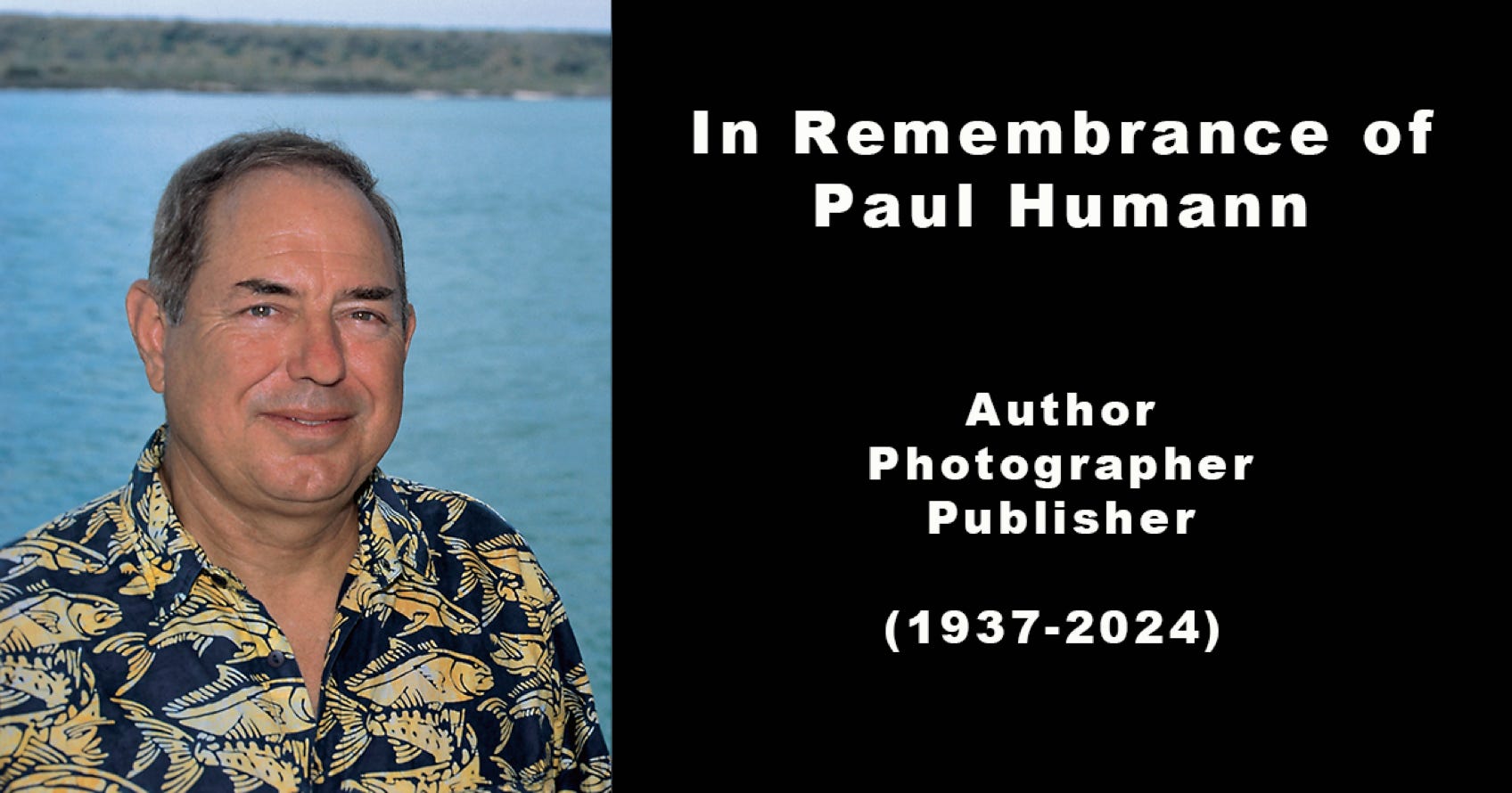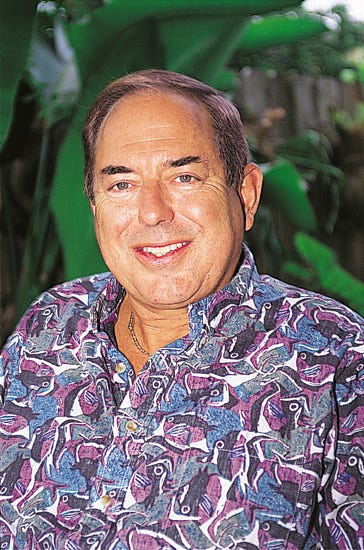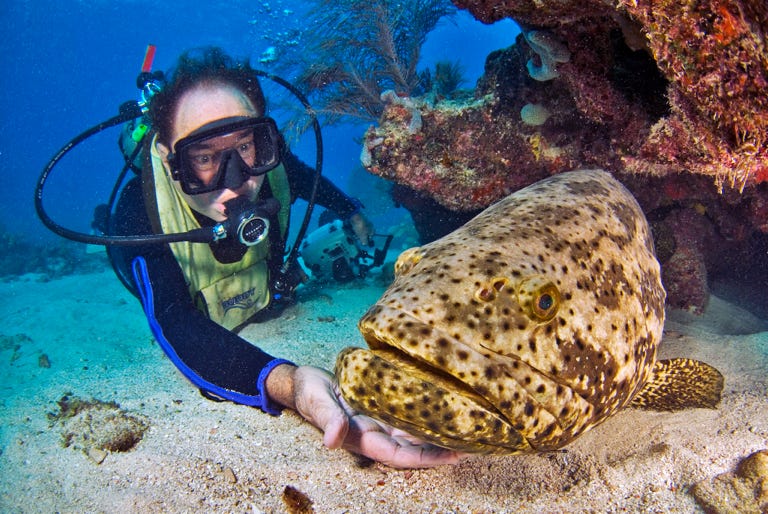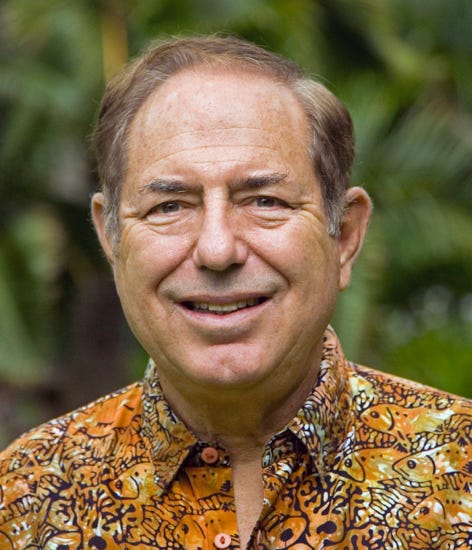Paul Humann - Author/Photographer/ Publisher
Paul Humann grew up in Wichita, Kansas where he graduated from Wichita High School North in 1956. At Wichita State University he joined Phi Upsilon Sigma/Phi Delta Theta Fraternity and served as president in the fall of 1960. After graduating with a degree in biology, Paul attended Washburn Law School, receiving his J.D. degree in 1964. He subsequently practiced law in Wichita for seven years before becoming a partner in the 3rd largest law firm in the state at the time.
Paul learned to dive and took his first underwater photographs in the early 1960s, while still in law school. During the same period, he became a licensed, single engine airplane pilot. By the late 60s several of his fish portraits were published in Skin Diver Magazine’s memorable “Fish of the Month” series. He later joined the ranks of the Underwater Society of America and became its Vice-President of Photography, subsequently organizing the first national underwater photo contest for members.
His hobby became a way of life in 1971 when he left his successful law practice to become captain/owner of the M/V Cayman Diver, the Caribbean’s first live-aboard dive cruiser. As a result, Paul was instrumental in developing what became an intrinsic component of the sport diving industry. Scouting potential reef sites from the air for his diving guests was among his first exploratory projects in the islands. In the process he established Little Cayman’s now famous west side drop-offs and reefs as major Caribbean dive destinations.
Diving daily with guests for the next eight years allowed the unparalleled opportunity to photograph, document and study the biological diversity of the Caribbean’s coral reefs, setting the stage for what was to become the first comprehensive set of marine life identification books for divers. In 1980 he moved to South Florida to pursue his burgeoning publishing career.
Throughout the years, his marine life and travel images appeared in numerous magazines including National Geographic, Audubon, Natural History, National Wildlife, as well as numerous dive publications including Ocean Realm. During the same period, he independently published four marine life books.
In 1988 Paul joined forces with Ned DeLoach, founder of New World Publications, as co-Editor of Ocean Realm magazine. Finding that they worked well together, the pair established a long-standing partnership and subsequently self-published a series of marine life/diving related books (www.fishid.com), beginning with the popular, user friendly, reference trilogy, Reef Fish Identification, Reef Creature Identification and Reef Coral Identification - Florida, Caribbean, Bahamas. The second edition of Reef Fish Identification received the publishing industry's Benjamin Franklin Award, voted the best reference book of 1994. Together the pair authored, photographed, and published 14 marine-related books for underwater naturalists.
Paul’s groundwork for the field guides ultimately established visual identification criteria for innumerable marine species, making it practical for naturalists as well as marine scientists to make valid non-impact biodiversity assessments of reef ecosystems for the first time. To assure scientific validity Paul closely collaborated with dozens of marine taxonomists. In many instances picture/voucher specimen collection was required to make positive identifications. As a result, many of his photos were the first ever published of living species in their natural habitat. The specimens from this work now reside in the Smithsonian’s National History Museum collections. Because of his ongoing contributions to science, several previously undocumented species were named in his honor over the decades including: the Ornate Cup Coral, Coenocyathus humanni, from the Tropical Western Atlantic; Ophichthus humanni, an eel inhabiting the Western Pacific, and a beautiful fairy wrasse, Cirrhilabrus humanni, from Indonesia.
During the 1980s Paul led numerous diving tours under the auspices of See & Sea Travel. Most popular were his frequent excursions to the Galapagos Islands where he pioneered diving in the now famous hammerhead-shark-laden waters of Darwin and Wolf Islands. In the following decades he privately led annual fish watching expeditions to tropical seas around the equator.
Paul and Ned’s concern for the welfare of the marine environment led to their founding of REEF Reef Environmental Education Foundation in 1990, based in Key Largo, Florida (www.REEF.org). REEF’s mission to protect biodiversity and ocean life by actively engaging and inspiring the public through citizen science, education, and partnership with the scientific community, continues to guide the organization into its fourth decade. Its cadre of trained volunteer recreational divers and snorkelers have compiled the largest fish-sighting data base in the world, housing nearly 300,000 surveys as of 2024. REEF’s ongoing efforts have contributed a steady flow of population trends and species range extensions – much like the work of terrestrial bird watchers. REEF is also widely acclaimed for the Grouper Moon Project: a two-decades-long collaboration with the Cayman Islands Department of Environment for studying, monitoring, and safeguarding one of the last remaining annual spawning aggregations of the Caribbean’s iconic Nassau Grouper. The conservation organization was at the forefront monitoring and assessing the impact on local reef fish populations by the Red Lionfish, as the invasive predator rapidly spread throughout the Tropical Western Atlantic. Paul continued his volunteer work with REEF, acting as chairman of REEF’s Board of Trustees until 2021 when he became the organization’s first Trustee Emeritus.
In recognition of their authoritative guidebooks and the founding of REEF, the publishing partners received the U.S. Coral Reef Task Force’s Outstanding Public Awareness and Education Award in 2006. Paul’s other notable tributes and honors include being named a 2006 recipient of The Diving Equipment and Marketing Association’s Reaching Out Award, induction in 2007 into the International Scuba Diving Hall of Fame, and in 2010 was the recipient of the NOGI award from the Academy of Underwater Arts and Sciences, for his efforts to preserve the underwater world.
In lieu of flowers, memorials in Paul’s honor may be directed to REEF Reef Environmental Education Foundation (www.reef.org). A celebration of life will be scheduled in the near future.



